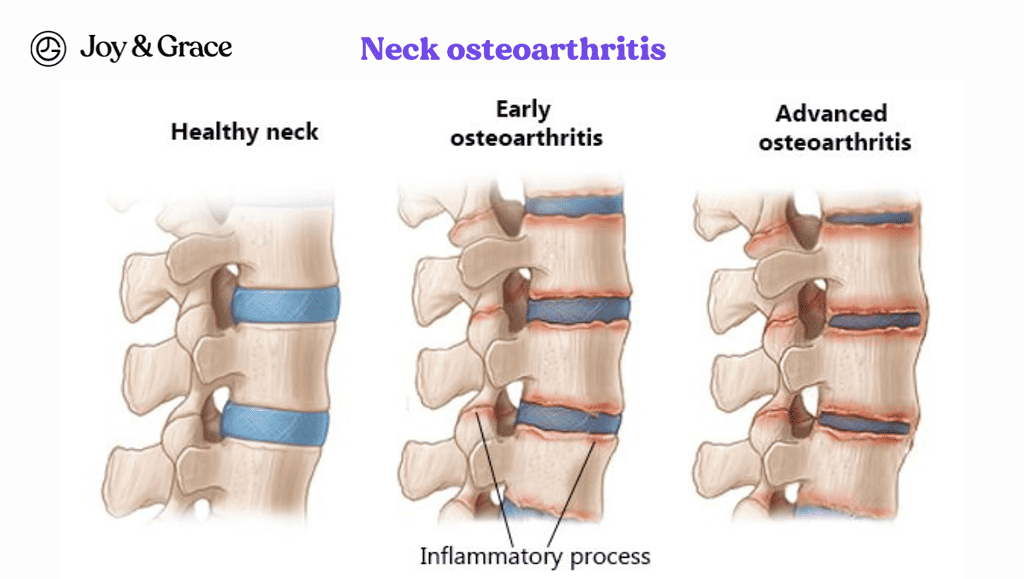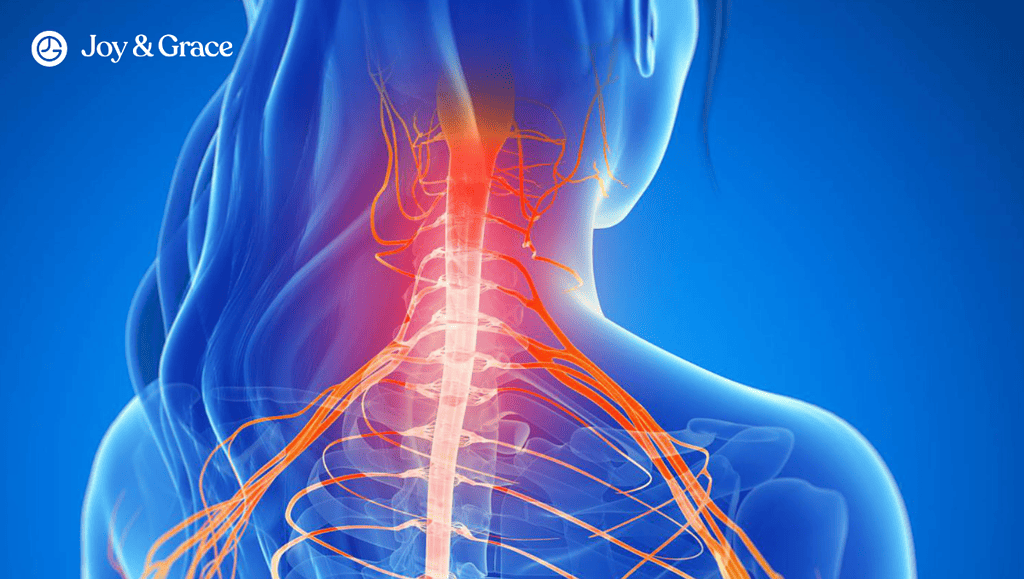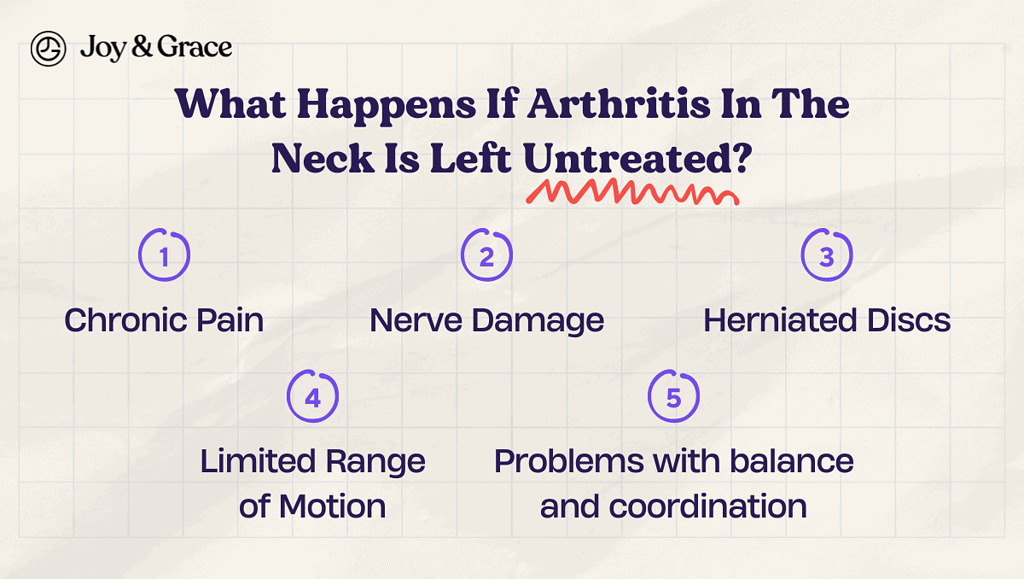Arthritis is an annoying, chronic condition that affects the joints of your body. And that can include the joints of your neck. Arthritis is not only a painful condition but can also stop you from enjoying daily life.
Unfortunately, there is currently no cure for this condition, but there are ways to manage the symptoms of arthritis and improve quality of life.
At Joy & Grace, we understand how challenging it can be to live with arthritis and neck pain. That’s why we’ll be delving deeper into neck pain caused by arthritis. We hope that by the end of this article, you’ll have the information you need to deal with that pain in your neck and get back to enjoying life!
Is My Neck And Shoulder Pain From Arthritis?
Neck and shoulder pain can have various causes, and one possibility is arthritis. Arthritis is a condition that causes inflammation and stiffness in the joints. However, there are more common causes of neck pain, including:
- Muscle strains or sprains
- Poor posture
- Herniated discs
- Pinched nerves
- Overuse injuries
Read on as we explain the nuances of neck and shoulder pain suggestive of arthritic origin.
What Is The Most Common Arthritis In The Neck?

The most common form of arthritis in the neck is osteoarthritis. Another way osteoarthritis in the neck is commonly referred to is cervical spondylosis (from Greek, “spondylos” meaning vertebrae, and “osis” meaning problem). It typically occurs in people over the age of 60. However, it’s not uncommon for younger people to experience it.
Cervical spondylosis is caused by the natural wear and tear of the bones and cartilage in the neck joint. Over time, small bone spurs form on the joints and ligaments, leading to pain and discomfort.
The bony projections can also put pressure on the nerves that run through the neck, resulting in tingling sensations and numbness.
However, not all people with cervical spondylosis will experience neck pain.
According to Dr. Thomas Mroz, MD, Director of the Center of Spine Health, “You can have 100 people with arthritis with the same amount of degenerative changes in their cervical spine, and only a small percentage have neck pain.”
Because of this, the signs of cervical spondylosis are a better indicator of how severe it is than how bad it looks on imaging tests.
What Are Other Types Of Arthritis That Can Cause Neck Pain?
Arthritis is a broad term for diseases that cause joint inflammation and pain. Arthritis should not be confused with arthralgia, which means simply joint pain. The hallmark of arthritic conditions is the inflammatory process behind it.
Now, to get to the point. There are many different types of arthritis, and each may affect various joints in the body. The types of arthritis commonly associated with neck pain include:
Rheumatoid Arthritis
Another type of arthritis that can cause neck pain is rheumatoid arthritis. Unlike osteoarthritis, rheumatoid arthritis is an autoimmune disease. This means your immune system attacks your body's tissues.
This can cause painful inflammation in the joints, including the neck. People with rheumatoid arthritis often experience:
- Stiffness
- Swelling in their joints
- Difficulty and pain when moving
According to a study, neck pain is the most common symptom when rheumatoid arthritis (RA) affects the spine, occurring in 40-80% of patients.
Ankylosing Spondylitis
Ankylosing spondylitis is a chronic inflammatory disease primarily affecting the spine. In some cases, it can cause inflammation in the cervical spine, causing neck pain and stiffness.
According to a study, the longer you have ankylosing spondylitis, the higher the chances your neck will be affected. Here are the percentages based on the disease duration, according to the reports of a 2003 study:
- After 5 years, about 19.6% of patients had signs of the disease in their neck.
- After 10 years, this percentage increased to around 29.9%.
- After 15 years, approximately 45.1% of patients had neck involvement.
- And after 20 years, the percentage rose to 70.0%.
Psoriatic arthritis
Psoriatic arthritis (PsA) is a type of inflammatory arthritis that occurs in some individuals with psoriasis. Psoriasis is a skin condition characterized by red, scaly patches on the skin. According to a study, psoriatic arthritis has the highest likelihood of causing neck issues, with 35-75% of PsA patients having cervical spondylitis.
Gouty Arthritis
Gouty arthritis, also known simply as gout, is a type of arthritis caused by the buildup of uric acid crystals in the joints. Uric acid is a waste product that usually dissolves in the blood and is excreted through the kidneys.
However, uric acid levels become elevated in individuals with gout, leading to sharp, needle-like crystals in the joints. According to a review, neck or back pain was the most common complaint in 68 patients with spinal gout.
What Are The First Signs Of Arthritis In The Neck?

The first sign of arthritis in the neck is usually pain or stiffness in the neck area.
You may notice difficulty turning your head or your neck feeling sore after a long day. This pain may worsen in the morning or after a period of inactivity.
Other early signs of arthritis in the neck may include:
- Headaches
- Numbness or tingling in the arms or fingers
- A clicking or grinding sound when you move your neck.
You may also notice that your posture is affected, with your head leaning forward or to one side.
Remember, the early signs of arthritis in the neck may be subtle, but they are important to pay attention to. By catching the condition early, you can take steps to manage your symptoms and protect your quality of life.
Does Neck Arthritis Come On Suddenly?

Unfortunately, neck arthritis can come on suddenly, causing intense pain and discomfort. Although some people may experience a gradual onset of symptoms, others may have a sudden onset of neck arthritis.
This can be due to several factors, such as:
- Trauma
Trauma to the neck, such as whiplash from a car accident, can cause sudden damage to the joints in the neck, leading to arthritis. This is called post-traumatic arthritis and is more common in younger adults.
- Repetitive motions
Repetitive motions can lead to the gradual deterioration of the neck joints, contributing to the onset of arthritis.
- Genetics
Unfortunately, genetics also play a role in developing neck arthritis. If a family member has arthritis, you may be at a higher risk of developing it yourself.
- Poorly treated or untreated disease
Untreated disease can lead to various neck arthritis symptoms and complications.
If rheumatoid arthritis is left untreated or not adequately managed, it can lead to sudden symptoms of subluxation.
Subluxation refers to the partial dislocation of joints, which can occur in the neck. This can cause severe pain, limited range of motion, and difficulty performing daily activities.
Therefore, it’s essential to seek early diagnosis and appropriate treatment for all types of arthritis in the neck.
Can Arthritis Cause Nerve Pain In The Neck?

Yes, arthritis can cause nerve pain in the neck. As we mentioned earlier, bone spurs can compress the nearby nerves in the neck. Additionally, the inflammation associated with arthritis can irritate the nerves in the neck.
When this happens, it can cause cervical radiculopathy (“radix,” from Latin, meaning root, as in spinal nerve roots, and Greek “pathos,” meaning suffering or disease). This can result in pain, tingling, or numbness that may radiate down the arms.
When left untreated, arthritis can contribute to the development of spinal stenosis. Spinal stenosis is a condition where the spinal canals narrow. This can put pressure on the spinal cord and nerves.
How Long Does Neck Arthritis Last?
Unfortunately, this question has no set answer as it varies greatly from person to person and which type of arthritis is present. For example, for the most part, pain from cervical spondylosis may not be long-lasting and can improve within 6-12 weeks.
On the other hand, rheumatoid arthritis in the neck that isn't handled properly can last longer and lead to chronic neck pain and further damage.
How Serious Is Neck Arthritis?
For some people, neck arthritis may only cause mild discomfort and nuisance. For others, it can significantly impact their quality of life.
Some factors that can influence the severity of neck arthritis include:
- The extent of disk degeneration in the cervical spine
- The age of the individual
- Overall health
- Treatment adherence, if needed.
Certain lifestyle factors can also exacerbate neck arthritis and lead to more severe symptoms. These include:
- Poor posture
- Lack of exercise
- Using technology too much without the right posture or tools to keep your body aligned
While neck arthritis is generally not considered life-threatening, you must take it seriously. Left untreated, neck arthritis can permanently damage the cervical spine.
What Happens If Arthritis In The Neck Is Left Untreated?

While it isn’t life-threatening, arthritis in the neck can cause serious issues when left untreated. Here, we examine some of the dangers arising from arthritis in the neck if left untreated:
- Chronic Pain
Causing persistent discomfort, impacting daily activities and quality of life.
- Nerve Damage
Resulting in sensations of numbness, tingling, or weakness in the neck and surrounding areas.
- Herniated Discs
Where the cushions of your spine bulge out or rupture, leading to pain and potential nerve compression.
- Limited Range of Motion
Resulting in neck stiffness and decreased flexibility, limiting the ability to move and rotate the neck freely.
- Problems with balance and coordination
Neck arthritis can disrupt the normal functioning of the neck and spine and can affect your balance and coordination. This can make activities like walking or maintaining stability more challenging.
Can Arthritis In The Neck Cause Paralysis?
It’s understandable for people to be concerned about paralysis because arthritis in the neck can lead to nerve compression. As a result, many people wonder if this compression can lead to paralysis.
The answer is no. We found no studies that suggest arthritis can cause paralysis. However, cervical spondylosis can lead to cervical myelopathy when left untreated.
Cervical myelopathy occurs when the spinal cord in the neck region is compressed or damaged due to the wear and tear brought about by arthritis.
Although cervical myelopathy does not cause paralysis, it can cause symptoms that may be confused with paralysis, such as:
- Feeling weak or numb in the hands and arms
- Difficulty with balance and coordination
- Difficulty using your hands and fingers with precision
How Do You Prevent Arthritis In The Neck?

It’s important to note that certain types of arthritis, like rheumatoid arthritis, can’t be prevented. However, there are ways to decrease your chances of developing some types of arthritis. These include:
- Maintaining a healthy weight
Being overweight puts extra pressure on the joints, particularly the neck. By maintaining a healthy weight, you can reduce the load on your joints and lower your risk of developing arthritis in the neck.
- Exercise regularly
Exercise not only helps you maintain a healthy weight but also helps strengthen your neck muscles and improves blood flow.
- Use good posture
Neck pain can often be caused by poor posture. By adopting good posture habits, you can reduce the strain on your neck joints and lower your risk of developing arthritis in the neck.
- Avoiding smoking and minimizing alcohol consumption
Smoking and excessive alcohol intake are risk factors for developing certain types of arthritis. This includes rheumatoid arthritis.
Quitting smoking and drinking less booze can make it less likely that you will get arthritis in your neck.
- Incorporate joint-friendly foods into your diet
Eating a diet rich in joint-friendly foods, such as omega-3 fatty acids found in fish, can help reduce inflammation. Limiting food and drinks high in uric acid is also important to help reduce your chances of developing gouty arthritis.
- Limit repetitive motions
Repetitive motions, such as constantly looking down at a phone or computer screen, can strain the neck joints. Limiting these motions can reduce the strain on your neck joints. - Manage stress
Chronic stress can cause inflammation and hurt your general health, including your joints. Finding healthy ways to deal with stress could make you less likely to get arthritis in your neck. - Protect your neck during physical activities
Using the right gear and skills to keep your neck from getting hurt is important when playing sports or doing other physical activities. Neck injuries that could lead to arthritis can be prevented by:
- Wearing helmets
- Using the right neck support
- Performing safe movements
By following these steps, you can reduce your risk of developing arthritis in the neck and improve your overall neck health. Remember, prevention is key, and taking care of your neck now can help to prevent future issues.
What Is The Best Treatment For Neck Arthritis?

- Physical Therapy
Physical therapy is often recommended as a first-line treatment for neck arthritis. It involves a range of exercises and techniques that help improve mobility and reduce pain.
Your physical therapist will teach you how to stretch and strengthen the muscles in your neck and shoulders, which can help relieve pressure on the neck.
Physical therapy can also help improve your posture, which is important for reducing strain on the neck.
- Medications
Pain medications can also help manage the symptoms of neck arthritis. Over-the-counter pain drugs can help reduce pain and inflammation. Muscle relaxants can also help alleviate stiffness and spasms.
In some cases, steroid injections may be recommended to help reduce inflammation.
On the other hand, disease-modifying agents are medications used to slow the progression of the disease. They’re primarily in rheumatoid arthritis. They work by targeting the underlying causes of the disease and modifying the immune system's response. These agents can help reduce inflammation, prevent tissue damage, and improve overall disease outcomes. They are an important part of the treatment plan for these chronic conditions and can help patients maintain a better quality of life.
- Lifestyle Changes
The lifestyle changes we mentioned above can also help manage the symptoms of neck arthritis. You may also benefit from heat or ice therapy, which can help ease inflammation and improve circulation.
- Surgery
In severe cases, surgery may be necessary to relieve pressure on the nerves in the neck. This may involve removing damaged discs or fusing vertebrae together. However, surgery is usually only recommended as a last resort after other failed treatments.
Is Massage Good for Neck Arthritis?
While many treatment options exist, massage therapy can be a relaxing approach to relieving arthritis-related neck pain.
So, is massage good for neck arthritis? The answer is a resounding YES. According to a study, massage therapy provided short-term relief of pain and limited range of motion in patients with neck arthritis.
If you want to try massage therapy, work with a licensed and experienced massage therapist who can tailor the massage to your condition.
How is Neck Arthritis Diagnosed?
Not all neck pain is due to arthritis; your healthcare provider must make an accurate and timely diagnosis.
The primary methods for diagnosing neck arthritis are physical exams and medical history. Your doctor will check your neck for tenderness, swelling, and range of motion. They will also look for muscle weakness, changes in reflexes, and any other neurological symptoms.
In addition to a physical exam, your doctor may order additional diagnostic tests. These tests could include the following:
- X-rays, which can help show bone spurs or other changes in the spine
- A CT (computed tomography) scan to provide more detailed spine images
- An MRI (magnetic resonance imaging) to detect nerve compression or spinal cord damage
Takeaway
Neck arthritis is a chronic condition that causes pain and stiffness in the neck joints. Common types of arthritis that can cause neck pain include:
- Cervical spondylosis (cervical osteoarthritis)
- Osteoarthritis
- Rheumatoid arthritis
- Ankylosing spondylitis
- Psoriatic arthritis
- Gouty arthritis
While there is no cure, there are ways to manage symptoms and improve quality of life. It’s important to seek treatment and make lifestyle changes to prevent further damage.
Since there are numerous causes of neck pain besides arthritis, a correct diagnosis is essential for treatment.















